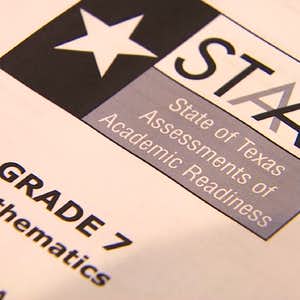Fort Worth public school leaders are taking new steps to close the achievement gap between white students and students of color.
School board members were set to vote Tuesday night on a new policy aimed at tackling institutional racism and bias. That includes things like how resources are distributed around the district and making sure all students get a high-quality education that connects to their own background.
One committee member who helped develop the policy tells NBC 5 it's long overdue.
The achievement gap between white students and minority students is one of the biggest challenges nearly every school faces. It's not a gap of love or care. Every parent wants their child in a strong school, with the best resources.
"It helps our kids learn and get out here and do what they need to do," said Fort Worth parent Cherrysh Anderson.
But right now resources are not equal, says Max Krochmal, a history professor at Texas Christian University, who specializes in comparative race and ethnic studies. He's also a member of the Racial and Ethnic Equity committee for Fort Worth Independent School District.
He says it's not just about what school buildings look like.
Local
The latest news from around North Texas.
"What books are in the library?" said Krochmal. "Are there books that are culturally relevant to the kids who go to those schools? Is there curriculum that's culturally-relevant?"
The new policy proposal includes offering elective courses in African-American, Latino and gender studies.
It also points to differences in how black and Latino kids are disciplined in school, compared to white kids.
"For the same infractions, they tend to receive more severe punishments," Krochmal said. "They miss class days that are reflected in lower test scores that then produce disciplinary actions against their schools sometimes."
For Krochmal, this is now personal. His son is in pre-K in the Fort Worth public schools.
"What I want him to experience in public education is what it takes to become a citizen in a diverse, multicultural, global society," said Krochmal.
He adds that only starts with an honest look at what divides us and what brings us back together.
"The first step to addressing racial inequality is recognizing that it exists," said Krochmal.
The school board was expected to take its first-round vote on the policy Tuesday night. They're also set to approve district-wide training in racial equity that includes recognizing implicit bias and fighting against it.
This is part of a larger strategy that includes the superintendent cutting $1.3 million from his administrative staff and shifting that money to help struggling schools that aren't meeting state standards.



